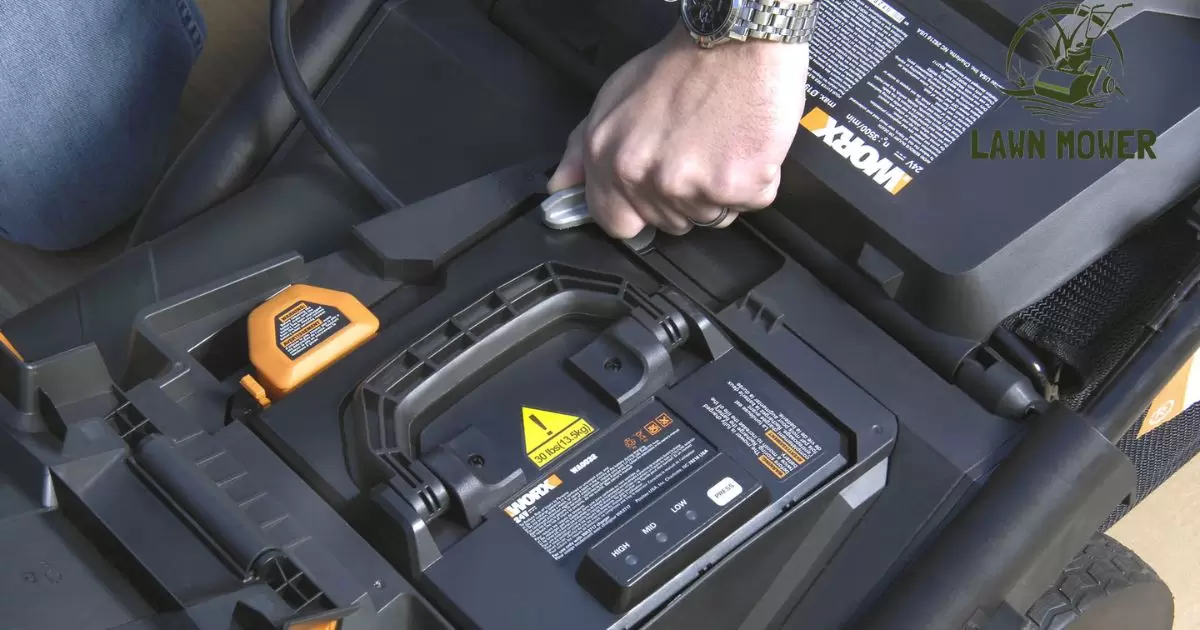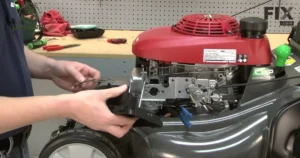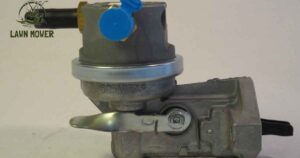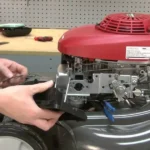A typical lawn mower battery operates at 12 volts, providing power for engine start and electrical components. Using the manufacturer-specified battery is crucial for optimal performance. Regular maintenance, including changing the oil, enhances longevity and efficiency, ensuring smooth operation.
Curious about powering your lawn mower? Wondering, How Many Volts Are In a Lawn Mower Battery? Understanding the voltage of your mower’s battery is essential for optimal performance. Let’s delve into this vital question to ensure your lawn stays perfectly manicured.
Lawn mower batteries typically operate at 12 volts, providing the necessary power for starting the engine and running electrical components. This voltage is standard for most residential lawn mowers, ensuring efficient performance during use. It’s essential to choose a battery with the correct voltage to maintain the proper functioning of the mower.
Energy Storage Battery
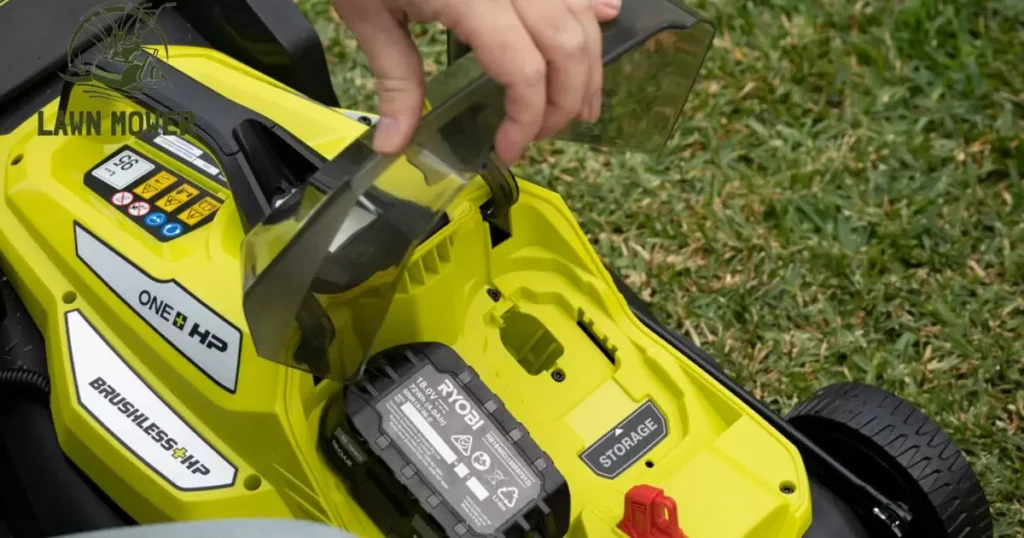
The energy storage battery in a lawn mower is a rechargeable power source that enables the machine’s operation without a constant connection to external power. Utilizing modern lithium-ion technology, these batteries vary in size and capacity, providing a lightweight and long-lasting solution for a cord-free and eco-friendly lawn care experience.
The convenience of a battery-powered lawn mower lies in its freedom of movement and ease of use, eliminating the need for cords or traditional gasoline engines. With zero emissions during operation, these environmentally friendly batteries contribute to a cleaner and quieter lawn care routine. Advancements in technology continue to enhance the efficiency of these batteries, offering users a more convenient and sustainable approach to maintaining their lawns.
Tubular Battery
A tubular battery for a lawn mower is a specialized energy storage unit designed to deliver consistent power for the efficient functioning of the mower. Its distinctive tubular positive plates set it apart from conventional flat plate batteries, providing enhanced durability and performance.
This unique design ensures that the battery can withstand the demands of frequent start-stop operations, common in lawn mowing activities.The robust construction of tubular batteries makes them well-suited for the challenging conditions encountered during lawn maintenance.
With a focus on deep discharge recovery, these batteries are adept at handling the varied and demanding power requirements of a lawn mower. The tubular battery’s reliability and extended
lifespan make it a practical choice, offering users a dependable and long-lasting power source for their lawn care equipment.
Power Sport Battery
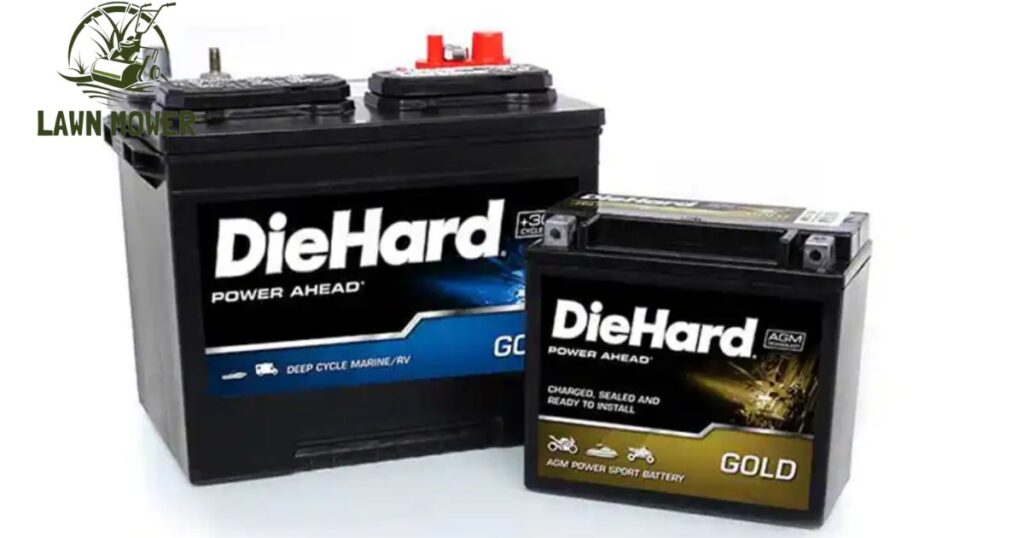
A power sport battery for lawn mowers is a compact and durable energy source designed to provide reliable starting power for small engines. Tailored to meet the demands of lawn and garden equipment, these batteries are maintenance-free, offering a hassle-free solution for users.
Their compact size ensures easy installation and storage in the limited space of a lawn mower engine compartment. With consistent and powerful bursts of energy, these batteries ensure quick and efficient starts, making them an ideal choice for those seeking reliability and convenience in their lawn care equipment.
Lithium Battery
Lithium batteries have transformed the way lawn mowers operate. These lightweight and high-energy-density batteries provide a longer runtime between charges, making lawn maintenance more efficient.
The durability and reliability of lithium batteries contribute to a convenient and hassle-free gardening experience, eliminating the need for frequent recharging and maintenance tasks such as watering.
Moreover, lithium batteries offer a slower self-discharge rate, ensuring that the mower remains ready for use even after extended periods of storage. With a quick and eco-friendly charging process, these batteries support a cleaner approach to lawn care, aligning with the growing trend of environmentally conscious practices.
Overall, the adoption of lithium battery technology in lawn mowers not only enhances maneuverability but also promotes a more sustainable and user-friendly solution for maintaining well-groomed lawns.
How to Test the Voltage of a Lawn Mower Battery?
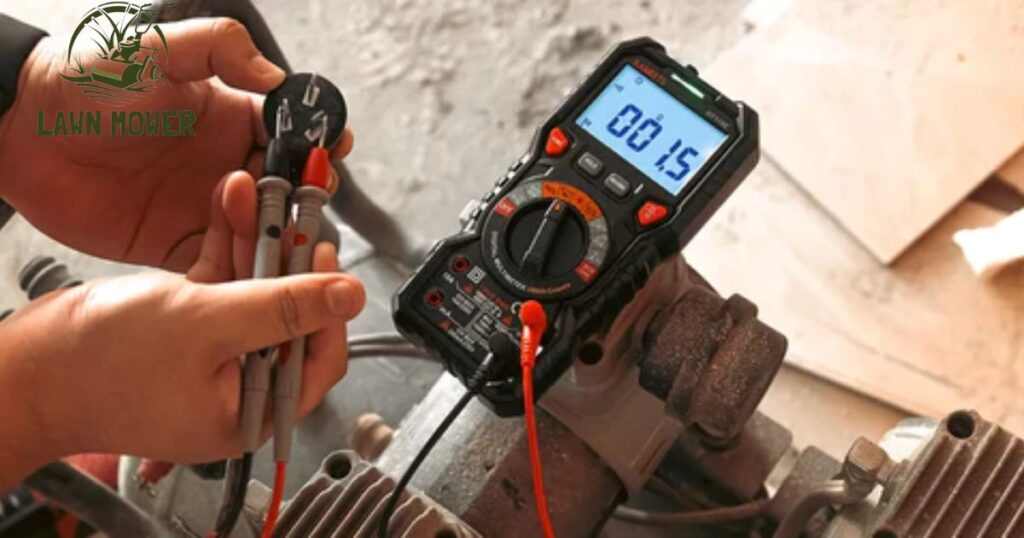
Testing a lawn mower battery’s voltage is simple and crucial for reliable starts. Locate the battery, use a multimeter on DC voltage setting, and connect the probes to the positive and negative terminals.
A healthy battery reads between 12.6 and 13.6 volts. If low, recharge with a proper charger, and retest. If the voltage remains low, consider replacement for optimal performance. Regular checks extend the battery’s life, ensuring a dependable mower for yard tasks.
Why Correct Batter Voltage is Important for Efficient Lawn Mower Operation?
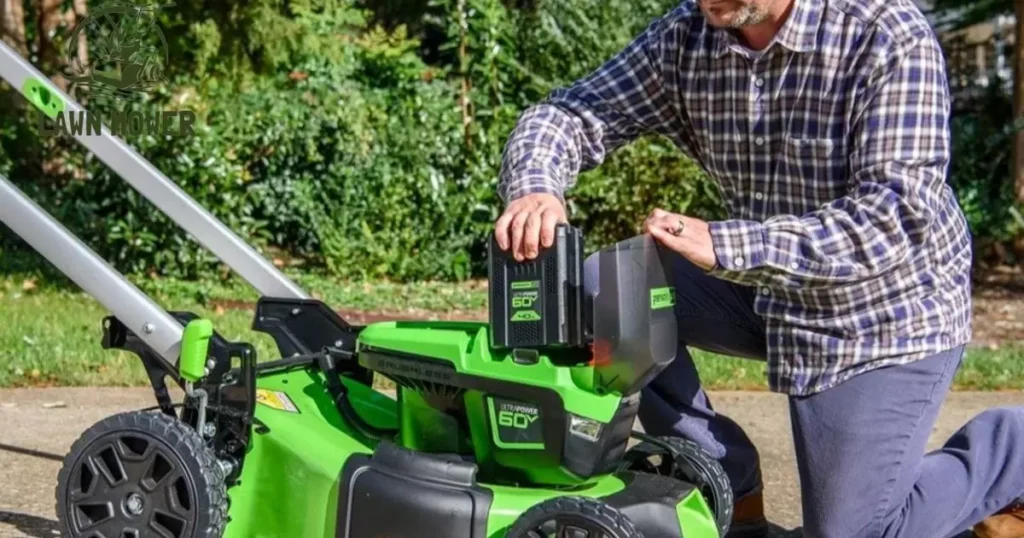
Maintaining the correct battery voltage is vital for the efficient operation of a lawn mower. The battery powers the engine’s ignition process, and if the voltage is too low, the mower may struggle to start, risking damage to the engine.Conversely, excessive voltage can overload the electrical system, leading to overheating and potential permanent damage.
Optimal battery voltage ensures a reliable start, smooth operation, and longevity of the lawn mower.Correct battery voltage is not only essential for starting the engine but also for powering electrical components like lights and electric starters.
Inconsistent voltage levels can cause issues such as flickering lights and difficulty engaging electric starters, compromising the mower’s efficiency and convenience. Regularly monitoring and maintaining the right battery voltage is key to a smoothly operating lawn mower, ensuring reliable starts and efficient yard maintenance.
Five Steps to Take If You Think Your Lawnmower Battery is Dead
1. Check the Connections
If you suspect a dead lawnmower battery, start by checking connections. Inspect terminals for corrosion, tighten loose connections with a wrench, and examine cables for damage. Cleaning corroded areas and addressing issues may solve the problem and extend the battery’s lifespan. Regular checks contribute to overall battery health.
2. Try a Charging Session
If you think your lawnmower battery is dead, try a charging session first. Ensure safety, connect the charger following instructions, and monitor the process. This simple step might revive the battery and get your lawnmower back in action.
3. Listen for a Clicking Sound
To check if your lawnmower battery is dead, listen for a clicking sound when attempting to start the engine. A clicking noise usually signals a low charge or faulty connections. First, inspect and clean the connections before considering battery replacement. If the clicking persists, recharge or replace the battery for optimal performance.
4. Verify the Voltage
When you suspect your lawnmower battery is dead, it’s crucial to verify its voltage using a multimeter. A healthy battery typically reads around 12 volts, and if the reading is significantly lower, it may need a recharge or replacement. Confirming the voltage helps accurately assess the battery’s condition and guides your next steps in addressing the issue.
How a Lawn Mower Battery Works
| Component | Function |
| Battery | Stores electrical energy in chemical form. |
| Electrolyte | A solution that facilitates the flow of ions between the battery’s positive and negative terminals. Commonly sulfuric acid in lead-acid batteries. |
| Positive Plate | Composed of lead dioxide, it reacts with sulfuric acid to release electrons. |
| Negative Plate | Made of lead, it reacts with sulfuric acid to form lead sulfate and releases electrons. |
| Separator | Insulating material that prevents direct contact between positive and negative plates, allowing only ion flow. |
| Electrochemical Reaction | Chemical reactions between the plates and electrolyte generate electrical energy. |
| Voltage | The potential difference between the positive and negative terminals, measured in volts (V). |
| Capacity | The amount of energy a battery can store, measured in ampere-hours (Ah). |
| Charging | Applying an external voltage to reverse the electrochemical reaction, restoring the battery’s charge. |
| Discharging | Releasing stored energy to power the lawn mower’s electric starter or electric motor. |
| Maintenance-Free | Some modern batteries are sealed and maintenance-free, eliminating the need to add water or check electrolyte levels. |
| Rechargeable | Designed to be recharged multiple times, extending the lifespan of the battery. |
| Types | Common types include lead-acid batteries, absorbed glass mat (AGM) batteries, and lithium-ion batteries. |
Lawn Mower Battery Cells
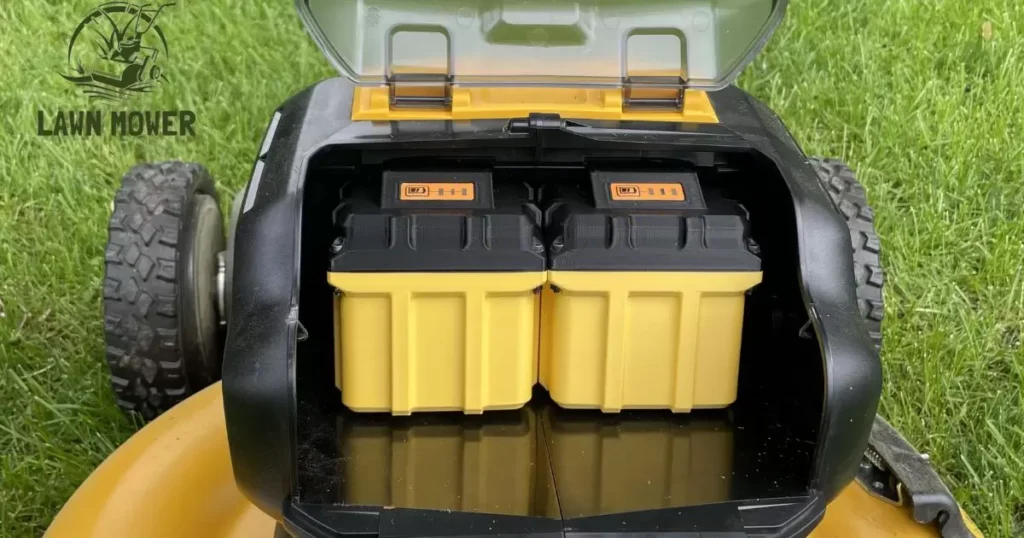
Lawn mower battery cells power electric mowers, using rechargeable lithium-ion or lead-acid cells for a lightweight and cordless design. These cells provide the energy needed to drive the mower’s motor and cutting blades, offering homeowners a convenient and environmentally friendly alternative to traditional mowers. Regular maintenance and proper charging contribute to their longevity and reliable performance.
Frequently Asked Questions
What is the normal voltage of a lawn mower battery?
The normal voltage of a lawn mower battery is typically 12 volts.
How many volts is a good lawn mower?
A good lawn mower usually operates on a 12-volt battery
What is the best voltage for a battery?
The best voltage for a battery depends on the specific requirements of the equipment, but 12 volts is common for many lawn mowers.
How long does a 12 volt battery last in a lawn mower?
A 12-volt battery in a lawn mower can last around 3-5 years, depending on usage and maintenance.
How do I know if my lawnmower battery is bad?
If your lawn mower struggles to start, or if it doesn’t hold a charge, it may indicate a bad battery; consider testing or replacing it.
Conclusion
Understanding the voltage of a lawn mower battery is crucial for proper maintenance and performance of your gardening equipment. As we explored the question, “How many volts are in a lawn mower battery?” It became evident that most lawn mower batteries typically operate at 12 volts. This information is essential for selecting the right replacement battery, ensuring proper charging, and maximising the efficiency of your lawn mower.
By staying informed about the voltage requirements, you can keep your lawn mower running smoothly, making yard maintenance a breeze. Remember, a well-maintained battery contributes to the overall longevity and effectiveness of your lawn mower, allowing you to enjoy a neatly manicured lawn with ease.

With a wealth of expertise spanning six years, I am a seasoned professional in the realm of lawn mowers. My mastery includes intricate knowledge of models, maintenance, and optimal performance.
